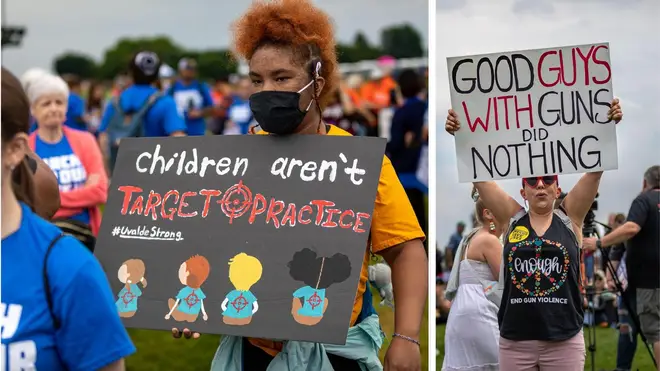
Shelagh Fogarty 1pm - 4pm
13 June 2022, 08:07 | Updated: 13 June 2022, 08:22

A potential breakthrough that could lead to the first significant new US gun law in decades has been announced by a cross-party group of senators.
Negotiators announced a bipartisan framework in response to the Uvalde school shooting in Texas, where a gunman massacred 19 children.
The plans presented include measured gun curbs and bolstered efforts to improve school safety and mental health programmes.
The framework falls far short of tougher steps long sought by President Joe Biden and many Democrats. But the accord was embraced by Mr Biden and enactment would signal a significant turnabout after years of gun massacres that have yielded little but stalemate in Congress.
Read more: US Capitol committee have enough evidence 'to consider a criminal indictment for Trump'
Mr Biden said in a statement that the framework "does not do everything that I think is needed, but it reflects important steps in the right direction, and would be the most significant gun safety legislation to pass Congress in decades".
Given the bipartisan support, "there are no excuses for delay, and no reason why it should not quickly move through the Senate and the House", he said.
Leaders hope to push any agreement into law rapidly - they hope this month - before the political momentum that has been stirred by the recent mass shootings in Buffalo, New York, and Uvalde, Texas, fades.
In a significant development, 20 senators, including 10 Republicans, released a statement calling for the framework's passage. This is potentially crucial because the biggest obstacle to enacting the measure is probably in the 50-50 Senate, where at least 10 Republican Party votes will be needed to attain the usual 60-vote threshold for approval.
"Families are scared, and it is our duty to come together and get something done that will help restore their sense of safety and security in their communities," the lawmakers said.
The group, led by senators Chris Murphy, John Cornyn, Thom Tillis and Krysten Sinema produced the agreement after two weeks of closed-door talks.
The compromise would make the juvenile records of gun buyers under the age of 21 available when they undergo background checks.
The suspects who killed 10 people at a supermarket in Buffalo and 19 students and two teachers at a primary school in Uvalde were both 18, and many of the attackers who have committed mass shootings in recent years have been young.
The agreement would offer money to states to implement "red flag" laws that make it easier to temporarily take guns from people considered potentially violent, and to bolster school safety and mental health programmes.
Some people who informally sell guns for profit would be required to obtain federal dealers' licences, which means they would have to conduct background checks on buyers. Convicted domestic abusers who did not live with a former partner, such as estranged ex-boyfriends, would be barred from buying firearms, and it would be a crime for a person to legally purchase a weapon for someone who would not qualify for ownership.
Negotiators said details and legislative language would be written over the coming days. Congressional aides said billions of US dollars would be spent expanding the number of community mental health centres and suicide prevention programmes, but that other spending figures remained undecided.
Finalising the agreement might produce fresh disputes and it was unclear how long this would take. But underscoring election-year pressures from Buffalo and Uvalde, the parties' shared desire to demonstrate a response to these shootings suggested momentum towards enactment was strong.
Senate majority leader Chuck Schumer for the Democrats called the accord "a good first step to ending the persistent inaction to the gun violence epidemic" and said he would bring the completed measure to a vote as soon as possible.
Senate minority leader Mitch McConnell, for the Republicans, who has supported the talks, was more restrained. He praised the negotiators' work and said he was hoping for a deal that made "significant headway on key issues like mental health and school safety, respects the Second Amendment, earns broad support in the Senate, and makes a difference for our country".
The agreement was quickly endorsed by groups that support gun restrictions including Brady, Everytown For Gun Safety and March For Our Lives, which organised rallies held around the country on Saturday.
The National Rifle Association said in a statement that it opposes gun control and infringing on people's "fundamental right to protect themselves and their loved ones", but supports strengthening school security, mental health and law enforcement. The group has long exerted its sway with millions of firearms-owning voters to derail gun control drives in Congress.
The agreement represents a lowest common denominator compromise on gun violence, not a complete sea change in Congress. Lawmakers have demonstrated a newfound desire to move ahead after saying their constituents have shown a heightened desire for congressional action since Buffalo and Uvalde, but Republicans still oppose the more sweeping steps that Democrats want.
These include banning assault-style firearms such as the AR-15-type rifles used in Buffalo and Uvalde, or raising the legal age for buying them.
The last major firearms restrictions enacted by lawmakers was the 1994 assault weapons ban, which Congress let expire 10 years later.
For years, congressional Republicans representing rural, pro-gun voters have blocked robust restrictions on firearms purchases, citing the Constitution's Second Amendment.
Democrats, whose voters overwhelmingly favour gun restrictions, have been reluctant to approve incremental steps that they have thought would let Republican lawmakers argue they have tried stemming the tide of violence without meaningfully addressing the problem.